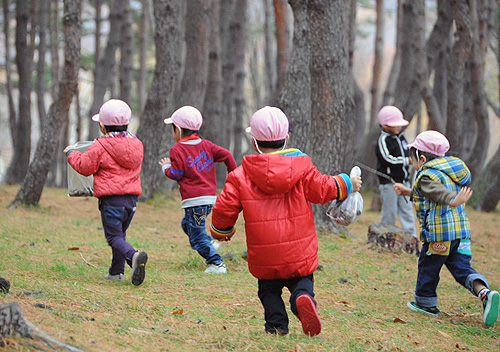
from Japan vol. 59 2012.01.06 Save the children of Fukushima - an initiative that began in Inawashiro to help children play outdoors
![]()
- Children of Fukushima, whose lives changed drastically
- Stress, which comes from being cooped up indoors, cause health issues
- A life where children have to worry about quantitative results
- Children's smiles are answers to everything
- Transforming nature's blessings into artwork
- Nature gives us reaffirmation
-
It shouldn't end in just a year or two
Breathing in the scent of the tall green grass and trees, discovering living organisms in the nooks and crannies, getting down and dirty in the mud. In recent years, there has been growing appreciation for education of young children that incorporates experiences in nature, as people have begun to see that coming in contact with nature is essential for nurturing children's five senses and the power to live. Having said that, at the moment there are children that cannot go out and play even if they want to. These are children living in Fukushima. Young children who want to run about are spending their days indoors afraid of the radiation. As concerns for their emotional wellbeing mount, an initiative, which aims to offer opportunities for children of Fukushima to play outdoors, has begun. Children are escorted on a bus to an area with relatively lower radiation and set free to play outdoors to their hearts' content. An NPO based out of Inawashiro, the Children's Forest Network, has taken on the office functions and newly launched a cooperative entity, the "Network to Help Fukushima's Children Play Outdoors." Mr. Naoyuki Hashiguchi, the director of the NPO Children's Forest Network took time to speak with us and show us around.
目次へ移動 Children of Fukushima, whose lives changed drastically
After the accident at the No.1 reactor in Fukushima the lives of children in Fukushima changed drastically. Is the food safe to eat? Can we play outdoors? What about the sandbox? The water? No matter how much emphasis is placed on safety, parents can't help but be worried. According to the survey among mothers of children aged 0 to 6 conducted in September by the toy manufacturer, Bornelund, on average 14.5% of mothers nationwide are letting their children play outdoors less in comparison to last year. This figure is as high as 75% in Fukushima. And 56.7% of mothers are worried that reducing the number of times they allow children to play outdoors may have an adverse effect on their growth.
Children are highly receptive when they are young. To come in contact with nature during this time stimulates their curiosities and helps nurture their cooperative spirit, therefore, in recent years, there has been growing focus on offering children opportunities to play in nature. Walking through the woods with undulating terrains and climbing trees will also help improve children's basic physical fitness. From the mid 1990s, children's education modeled after Denmark's Forest Kindergarten spread across Japan. This movement was fueled by parents' desire to help nurture children who are sound and enriched in both mind and body.
Mr. Naoyuki Hashiguchi, the director of the NPO Children's Forest Network, based in Inawashiro, opened a school in the forest called Forest Land, in the Bandai Plateau in 2000. They have conducted a wide range of programs such as the "Forest Kindergarten," which teaches young children how fun it is to play outside, the "Little Adventure," which lets children play in the rivers and waterfalls in the depth of the primeval forest, and "Playing in the Satoyama," where children get to eat berries and fruits and look for a wide variety of insects.
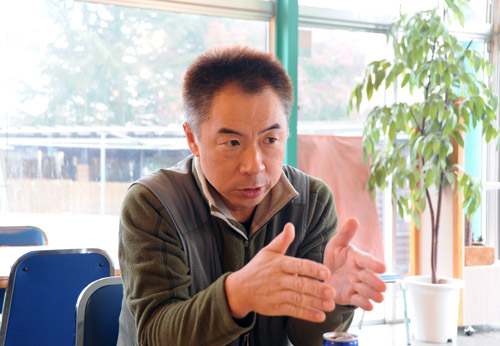 Mr. Hashiguchi says, "Nature teaches you how to be human."
Mr. Hashiguchi says, "Nature teaches you how to be human."
目次へ移動 Stress, which comes from being cooped up indoors, cause health issues
Mr. Hashiguchi was very much concerned about the children in Fukushima who cannot play outdoors even if they want to.
"We are at the second phase of the nuclear accident. Even if we presume that additional radiation will not be release, the radiation levels will not go down unless radioactive materials are decontaminated. If children can only play indoors, they become stressed, and there may be adverse affects on their health. What can be done when decontamination is progressing slowly? I wanted to let children play outdoors even if it was just over the weekend."
Fortunately radiation levels at Inawashiro are comparatively low, so he wanted to bring children there. But it should not be a one-off event; it needs to be an on-going initiative. So Mr. Hashiguchi began to create the necessary framework.
Just hiring a bus requires funds, and it would be difficult for kindergartens and schools to pay for it. On the other hand, depending on donations will not ensure longevity. So he applied for a fund Fukushima prefecture set aside for initiatives that help build communities. His project was given the go ahead and so this October the project to help "Fukushima's Children Play Outdoors" began. By next March, the cooperative will have organized 35 trips and invited 1,500 children and their chaperones to numerous facilities in the prefecture to offer children the opportunity to immerse themselves in nature.
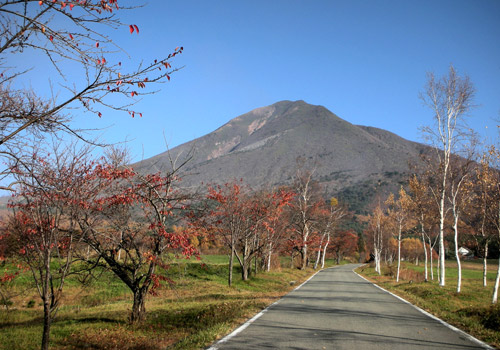 Fall foliage season at the Mt. Bandai (photograph provided by: NPO Children's Forest Network)
Fall foliage season at the Mt. Bandai (photograph provided by: NPO Children's Forest Network)
Mr. Hashiguchi was a writer for outdoor magazines. He often came to Mt. Bandai for work. He then fell in love with it and moved to Inawashiro in 1994. He once wrote an article about the wet bog there, and many a time he felt attracting many tourists with low morals who wreaked havoc on the local nature. This brought his self-contradiction into the spotlight.
He began to feel that "introducing how great nature is may actually have an adverse effect on nature itself. "To protect nature, you cannot communicate unilaterally. He felt that it was important to communicate a message over the long-term and so he shifted directions and began working as a nature guide. He thought that if he comes in contact with 10 people a day as a guide, after 10 tours he would have reached out to 100 people.
While working as a guide, he realized that it might be more important to point children into the right direction. Children, whose sense of values is still malleable, are more sensitive to nature's message. So Mr. Hashiguchi established the NPO Children's Forest Network to provide opportunities to come in contact with nature to children from an early age.
Mr. Hashiguchi explains.
"There are so many different types of nature you can learn from. I learned a lot from the forests myself. Nothing is better than first hand experiences. Biodiversities of yards and gardens, parks, and forests are different. It is said that having diverse experiences in diverse environments helps children develop abilities to adapt to changes in society and at schools."
Having said that, just letting children loose in the environment is not good enough. Having a leader, who understands nature, will help children see and discover many things.
With the "Play Outdoors" program, Mr. Hashiguchi takes care to make children forget about radiation. They live with radiation on their minds every day. Mr. Hashiguchi wants to set the children free from such a situation, and let them play in nature to their hearts' content. Needless to say, radiation levels will be measured in advance and they would avoid puddles and places where there are many dead leaves.
Mr. Hashiguchi admits that after the nuclear accident, he, too, was concerned about the unforeseeable future. But people from Aizu are strong and hardy, so they don't really mention their hardship. Mr. Hashiguchi decided to stay in Fukushima because he knew that there was something only he would be able to do.
目次へ移動 A life where children have to worry about quantitative results
We paid Mr. Hashiguchi a visit on November 14th. That was the day of the third session. The first session welcomed children from Iwaki City, and the second session welcomed a bus full of children from Fukushima City. And the third session welcomed children from the "Purimura Nursery School" located in Sukagawa City.
The "Showa No Mori" playground, located 10 minutes away by car from the Inawashiro station, was chosen as the site for this session. It is a beautiful natural site from which there is a great view of the Inawashiro Lake. On the ride from the station we saw Mt. Bandai standing tall and swans flocked in the fields on both sides of the roads. They were feeding on the ears that fell after the rice harvest in preparation for the winter.
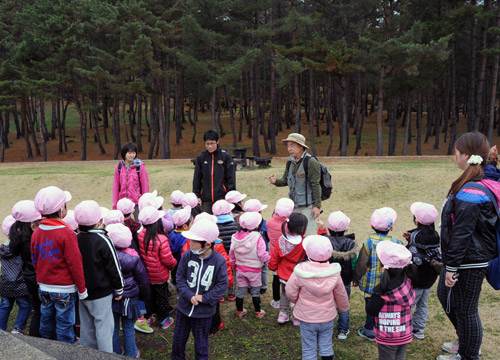 Children between the ages 3 and 6 came to visit. Please listen to the dos and don'ts before you go off playing.
Children between the ages 3 and 6 came to visit. Please listen to the dos and don'ts before you go off playing.
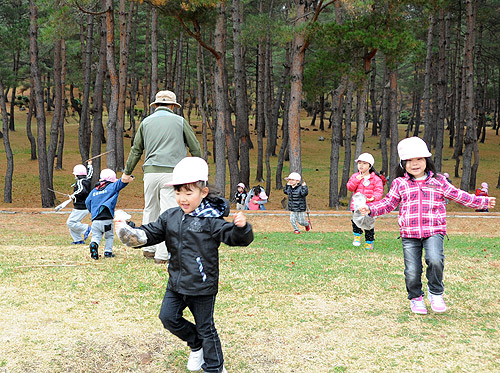 They scattered immediately.
They scattered immediately.
Unfortunately it was a cloudy day, and there was a mist over Inawashiro Lake, too, so you couldn't see it very well. But for the children it was a very special day nonetheless. A total of 36 children between the ages 3 and 6 arrived in a big bus after a one-hour ride.
Even before the accident, Purimura Nursery School had placed importance on offering children opportunities to come in touch with nature. Last year, with Mr. Hashiguchi's help, they organized a "Forest Kindergarten" project at a Satoyama near their kindergarten. They had given up doing it this year thinking it would be impossible, but learning that Mr. Hashiguchi had embarked on this program, they decided to stretch their legs and visit the safe haven, Inawashiro.
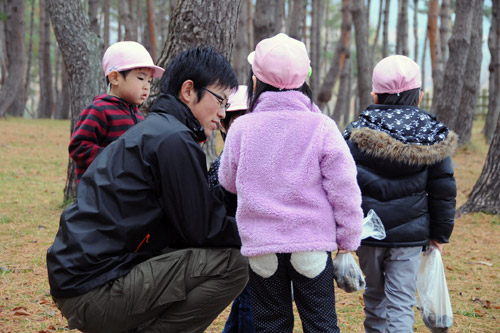 Did you find something? Hanging out with Mr. Tsuchiya, who supports this program.
Did you find something? Hanging out with Mr. Tsuchiya, who supports this program.
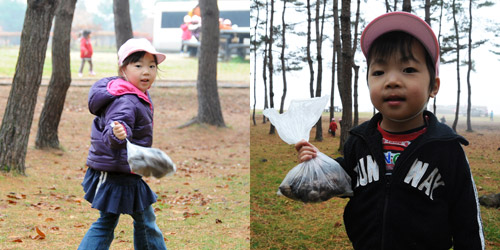
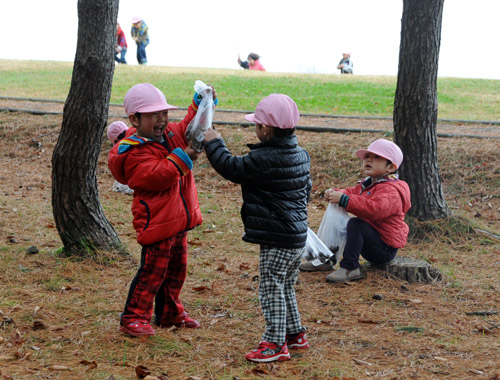 We found this many pinecones!
We found this many pinecones!
Children who got off the bus ran in all directions with amazing smiles. It was difficult to get them all to come back. They screamed with delight when they found pinecones and acorns, and when they discovered sow bugs underneath a stone, they hesitantly reached out to touch them. There were some children who found large mushrooms. Being told that they can't eat these mushrooms, they went and returned it to the spot they found them in.
There was a girl who looked at us with a worried expression each time she picked up an acorn or a fallen leaf. "Is there radiation on it? Is it ok to touch it?" Hearing the word radiation come out of a 4-year old child's mouth was heart wrenching. We were told that sometimes older children warn younger children not to touch something, and they sometimes even ask if it is all right to breath.
According to the principal of the nursery school, Ms. Fumiko Kumada, the radiation levels near the nursery school is not so high. But it is still a concern for parents. There are some parents who are quite worried about letting their children play outside. At the nursery school, they do as the parents wish, so there are children who continue to play outdoors and there are others who stay indoors.
We realized that children have been robbed of the "daily life." There are concerns about the adverse effects being cooped up indoors can have on children's health. According to the research conducted in the city of Koriyama, it has been found that the weight of children who should be in their growth phase are not increasing because they have not been able to play outdoors.
目次へ移動 Children's smiles are answers to everything
"For children, stress may have more adverse effect on their health than radiation. I often tell parents that if you have decided to stay in Fukushima, you need to make a decision for them" says Principal Kumada.
If children sense the parents' and teachers' hesitation, they may feel stressed, the strength of their immune system may deteriorate, and their bodies may become weaker."
This summer the pool at the nursery school was closed down. Before the earthquake, the nursery school had focused on local production, local consumption, and served vegetables and rice from Fukushima, but now they choose foods from other prefectures. Everything changed on that day, and you can feel their frustrations and regrets as guardians of the children's wellbeing.
Principal Kumada said that she was very happy that all the children were able to play together outdoors.
"(The answer to whether today's event was successful or not) shows on the children's faces. There have been many hardships, but it is great that there are so many people that support us. Everyone's support is helping the mothers keep going, too."
"We should not be afraid without cause, and we need to make a decision." Listening to Principal Kumada speak these words, I realized that we, as adults, have to remain strong in front of children.
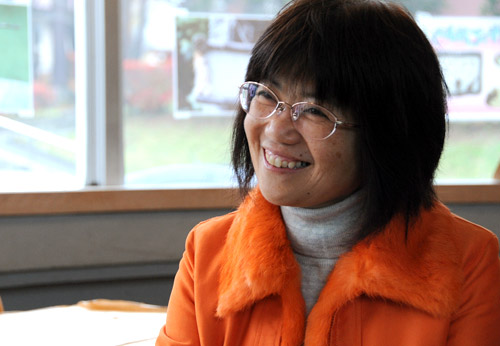 Principal Kumada said, "The children's smiles are our answers."
Principal Kumada said, "The children's smiles are our answers."
Because it began to rain lightly, the children were only able to play for about one hour and a half, but for small children this was plenty of time. When I asked, "Did you have fun?" they answered, "It was fun! We want to come back!" with a twinkle in their eyes.
目次へ移動 Transforming nature's blessings into artwork
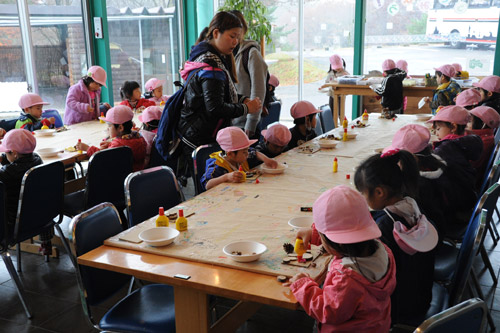 Next, the children spent time creating artwork. (At the House of Creative Experience - Waku Waku within the Green Village)
Next, the children spent time creating artwork. (At the House of Creative Experience - Waku Waku within the Green Village)
After lunch, the children took part in activities Mr. Hashiguchi has been conducting even from before the earthquake, the "Getting Creative with the Forest." Children are free to use various materials such as branches, pinecones, nuts and acorns to create a unique piece of work. Some children pile the materials up high, some others created their interpretation of the "spring" season - the children's creative ideas were very refreshing. They all created fine masterpieces.
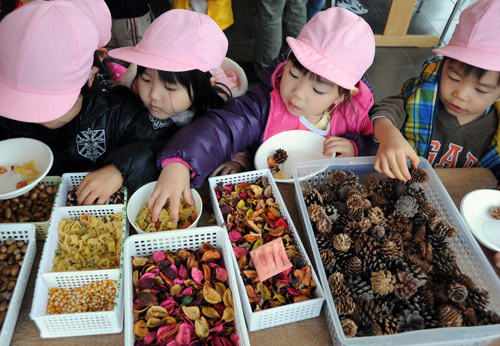 Which materials should I use? Let's make a masterpiece!
Which materials should I use? Let's make a masterpiece!
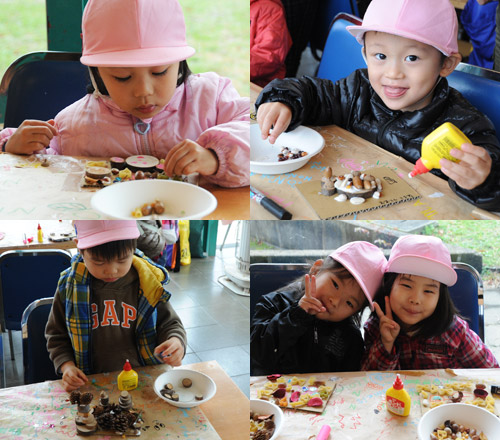 Look! I made a fantastic piece of work.
Look! I made a fantastic piece of work.
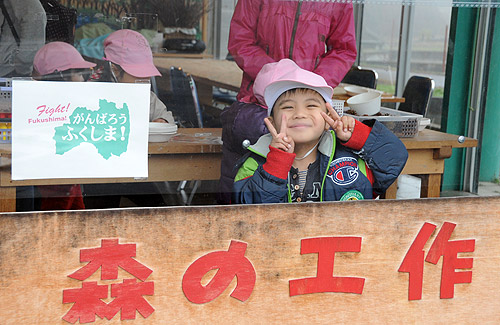 They are very happy with the time they spent.
They are very happy with the time they spent.
目次へ移動 Nature gives us reaffirmation
The 2 young people who supported the day's activities left quite an impression as well.
One person is originally from Inawashiro. Mr. Yuuki Tsuchiya just graduated from a university in Tokyo. He had gotten a job offer from the company he used to work for part time, but after March 11th, he turned down that offer and returned home to see if there was something he could do. He went to volunteer at the gymnasium, which served as a shelter (at one time for as many as 500 people), without an appointment. That is when he met Mr. Hashiguchi. Mr. Hashiguchi went to the town hall and tirelessly promoted creating a playground for children at the shelters. Mr. Tsuchiya helped with these activities.
He told us that his father, who is a rice farmer, said angrily, "What could you possibly do?" But his father has come to understand his son, who helps with the farm and also volunteers for various activities.
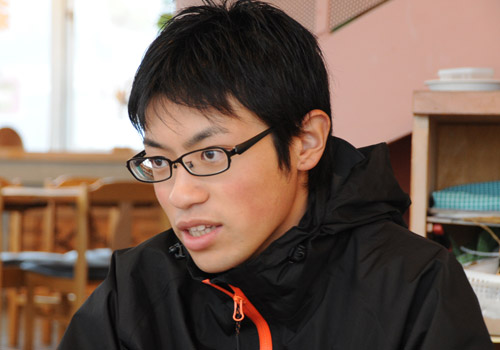 Mr. Tsuchiya couldn't sit still so he came back to Fukushima.
Mr. Tsuchiya couldn't sit still so he came back to Fukushima.
The other staff is Ms. Akari Saikai, who is a 4th year student at the Fukushima University. She is studying to get certified as a grade school teacher, daycare nurse, and a kindergarten teacher. She has been helping with the Forest Kindergarten activities for about a year now.
"Playing with children in nature has helped me come face to face with nature. The children and their interest and curiosity teach me many things. They help me see things from a different perspective."
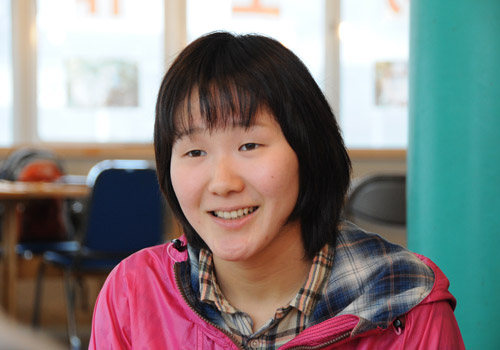 Ms. Saikai says that the children taught her how to interact with nature.
Ms. Saikai says that the children taught her how to interact with nature.
"What can you gain from facing nature?" When asked, she thought for a while and answered, "I feel like nature gives me reaffirmation. It is as though she is accepting everything about me."
Mr. Tsuchiya nodded his head in agreement. "Nature is really tolerant and magnificent. It gives us the power to live. When I first went to Tokyo, I was shocked to find myself in a society that did not interact with nature at all. It was a society where only mankind's rules applied. I was born in an environment that was closely integrated with nature, with the ocean, mountains, and rivers. These were the playgrounds I grew up with. At university, I became involved in environmental education activities, but it just seemed different. Here, you can really teach about nature. Children who know nature well, they are not as fragile. They are more robust. Being honed on a playground you are unfamiliar with makes you emotionally stronger, too."
Nature, who accepts you as you are, without condition, is a very important existence for children. The 2 staff, who have lived with nature, were very convincing. Mr. Hashiguchi also says, "Nature accepts everything." Nature, who is all accepting, is a great teacher for nurturing self-affirmation. Nevertheless there are children who are worried about wind direction rather than appreciating the warm embrace of the wind. You can sense the frustration in their voices.
目次へ移動 It shouldn't end in just a year or two
But because of such situation, perhaps nature will become an existence that will help melt the worry in children's hearts. Mr. Hashiguchi says that he wants to make sure that the "Play Outdoors" initiative won't become a one-off thing. There are initiatives that transport children to other prefecture during long breaks such as in the summer and winter, but they need day-to-day support, too. To keep providing children in Fukushima opportunities to play in nature requires hundreds of millions of yen.
"It's is quite a large sum, but we want to secure the funds for the children of Fukushima, so that we can continue the program for a long time to come. This is not a problem we can solve in a year or two. We should create a network with other organizations undertaking similar activities, so that we can create a framework to conduct activities all around Fukushima" said Mr. Hashiguchi.
What was most heart wrenching about this trip to Fukushima was that children there lived in fear of radiation. In areas that are far removed from the Fukushima nuclear plant, although adults may have concerns, the fear has not transcended to young children.
David Sobel wrote in his book, "Beyond Ecophobia: Reclaiming the Heart in Nature Education," he wrote that "what is important is that children have an opportunity to bond with the natural world, to learn to love it and feel comfortable in it, before being asked to heal its wounds."
Not only children in grade schools, but also even younger children in Fukushima have learned the frightfulness of environmental destruction. And they are stalked with the fear of not knowing how long this will continue. I could not help but feel that the children have not only lost the beautiful nature of Fukushima as their playground, but also that they lost precious time they could have spent with nature.
Of course I only saw a little bit of Fukushima. And I am not at all capable of telling you what hardship children who live in areas with even higher radiation levels are going through. But I became acutely aware that adults have to start raising our voices so that something like this will never happen again. I also strongly felt that it is imperative that we keep offering our financial, emotional, and physical support to the children currently living in Fukushima. We need to make sure that we do not rob the children of their precious time and future.
Related URL(in Japanese)
Network to Help Fukushima's Children Play Outdoors
http://www.sotoasobi.info/
Forest Land - A school in the woods http://www.fr-land.com/
Writer's profile
Atsuko Koizumi
fter working as a writer and editor of a weekly news magazine, she currently edits books. She also reports on educational issues and culture. She would like to examine and communicate about environmental and human issues from a wide range of perspectives.
Report, original text by: Atsuko Koizumi
Translated by: Yuri Morikawa(Oxygen Inc.)
Photographs and edited by: Soichi Ueda (Think the Earth)















